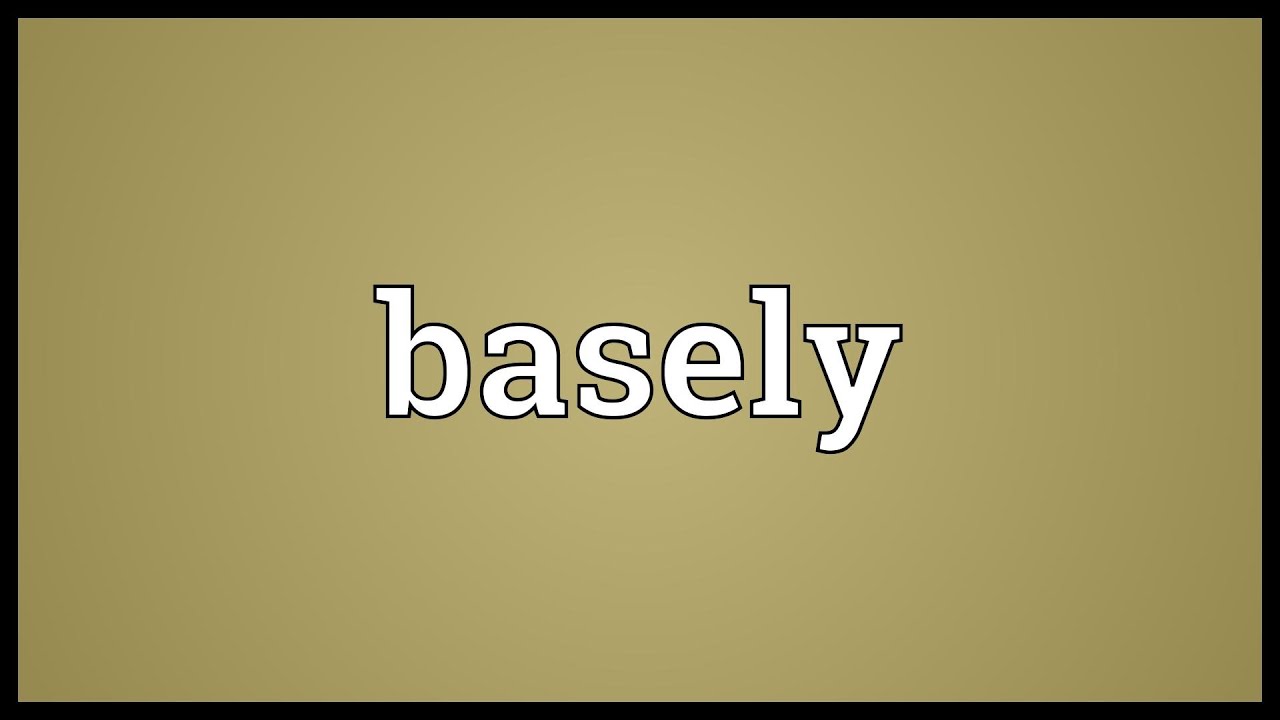
adjective, bas·er, bas·est.
- morally low; without estimable personal qualities; dishonorable; meanspirited; selfish; cowardly.
- of little or no value; worthless: hastily composed of base materials.
- debased or counterfeit: an attempt to eliminate the base coinage.
- characteristic of or befitting an inferior person or thing.
- of illegitimate birth.
- not classical or refined: base language.
- Old English Law. held by tenure less than freehold in return for a service viewed as somewhat demeaning to the tenant.
- Archaic.
- of humble origin or station.
- of small height.
- low in place, position, or degree: base servitude.
- Obsolete. deep or grave in sound; bass: the base tones of a piano.
noun
- Music Obsolete. bass1(defs 3, 4).
noun
- the bottom or supporting part of anything
- the fundamental or underlying principle or part, as of an idea, system, or organization; basis
-
- a centre of operations, organization, or supplythe climbers made a base at 8000 feet
- (as modifier)base camp
- a centre from which military activities are coordinated
- anything from which a process, as of measurement, action, or thought, is or may be begun; starting pointthe new discovery became the base for further research
- the main ingredient of a mixtureto use rice as a base in cookery
- a chemical compound that combines with an acid to form a salt and water. A solution of a base in water turns litmus paper blue, produces hydroxyl ions, and has a pH greater than 7. Bases are metal oxides or hydroxides or aminesSee also Lewis base
- biochem any of the nitrogen-containing constituents of nucleic acids: adenine, thymine (in DNA), uracil (in RNA), guanine, or cytosine
- a medium such as oil or water in which the pigment is dispersed in paints, inks, etc; vehicle
- the inorganic material on which the dye is absorbed in lake pigments; carrier
- biology
- the part of an organ nearest to its point of attachment
- the point of attachment of an organ or part
- the bottommost layer or part of anything
- architect
- the lowest division of a building or structure
- the lower part of a column or pier
- another word for baseline (def. 2)
- the lower side or face of a geometric construction
- maths
- the number of distinct single-digit numbers in a counting system, and so the number represented as 10 in a place-value systemthe binary system has two digits, 0 and 1, and 10 to base two represents 2 See place-value
- (of a logarithm or exponential) the number whose powers are expressedsince 1000 = 10³, the logarithm of 1000 to base 10 is 3
- (of a mathematical structure) a substructure from which the given system can be generated
- the initial instance from which a generalization is proven by mathematical induction
- Also called: base clause logic maths the initial element of a recursive definition, that defines the first element of the infinite sequence generated thereby
- linguistics
- a root or stem
- See base component
- electronics the region in a transistor between the emitter and collector
- photog the glass, paper, or cellulose-ester film that supports the sensitized emulsion with which it is coated
- heraldry the lower part of the shield
- jewellery the quality factor used in pricing natural pearls
- a starting or finishing point in any of various games
- baseball any of the four corners of the diamond, which runners have to reach in order to score
- the main source of a certain commodity or elementa customer base; their fan base
- get to first base US and Canadian informal to accomplish the first stage in a project or a series of objectives
- off base US and Canadian informal wrong or badly mistaken
- touch base to make contact
verb
- (tr foll by on or upon) to use as a basis (for); found (on)your criticisms are based on ignorance
- (often foll by at or in) to station, post, or place (a person or oneself)
adjective
- devoid of honour or morality; ignoble; contemptible
- of inferior quality or value
- debased; alloyed; counterfeitbase currency
- English history
- (of land tenure) held by villein or other ignoble service
- holding land by villein or other ignoble service
- archaic born of humble parents; plebeian
- archaic illegitimate
adjective, noun
- music an obsolete spelling of bass 1
“to place on a foundation,” 1841, from base (n.). Related: Based; basing.
“bottom, foundation, pedestal,” early 14c., from Old French bas “depth” (12c.), from Latin basis “foundation,” from Greek basis “step, pedestal,” from bainein “to step” (see come). The military sense is from 1860. The chemical sense (1810) was introduced in French 1754 by French chemist Guillaume-François Rouelle (1703-1770). Sporting sense of “starting point” ia from 1690s, also “destination of a runner” (1812). As a “safe” spot in a tag-like game, suggested from mid-15c. (as the name of the game later called prisoner’s base).
late 14c., “low, of little height,” from Old French bas “low, lowly, mean,” from Late Latin bassus “thick, stumpy, low” (used only as a cognomen in classical Latin, humilis being there the usual word for “low in stature or position”), possibly from Oscan, or Celtic, or related to Greek basson, comparative of bathys “deep.” Figurative sense of “low in the moral scale” is first attested 1530s in English, earlier “servile” (1520s). Base metals (c.1600) were worthless in contrast to noble or precious metals.
n.
- The part of an organ nearest its point of attachment.
- A fundamental ingredient; a chief constituent of a mixture.
- Any of a large class of compounds, including the hydroxides and oxides of metals, having a bitter taste, a slippery solution, the capacity to turn litmus blue, and to react with acids to form salts.
- A molecular or ionic substance capable of combining with a proton to form a new substance.Brønsted base
- A nitrogen-containing organic compound that combines in such a manner.
- A substance that provides a pair of electrons for a covalent bond with an acid.
- Chemistry
- Any of a class of compounds that form hydroxyl ions (OH) when dissolved in water, and whose aqueous solutions react with acids to form salts. Bases turn red litmus paper blue and have a pH greater than 7. Their aqueous solutions have a bitter taste. Compare acid.
- See nitrogen base.
- Mathematics
- The side or face of a geometric figure to which an altitude is or is thought to be drawn. The base can be, but is not always, the bottom part of the figure.
- The number that is raised to various powers to generate the principal counting units of a number system. The base of the decimal system, for example, is 10.
- The number that is raised to a particular power in a given mathematical expression. In the expression an, a is the base.
Any of a number of bitter-tasting, caustic materials. Technically, a material that produces negative ions in solution. A base is the opposite of an acid and has a pH of 7 to 14. A given amount of a base added to the same amount of an acid neutralizes the acid; water and a salt are produced. Alkalis are bases; ammonia is a common base.
see get to first base; off base; touch base.
 Liberal Dictionary English Dictionary
Liberal Dictionary English Dictionary


